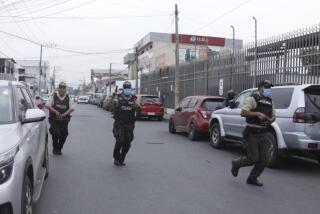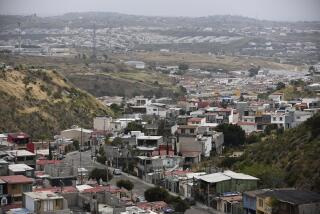Panama Ousts 5 Officers After Coup Attempt
PANAMA CITY — Five officers were ousted from Panama’s armed forces Thursday in the wake of a failed coup attempt against Gen. Manuel A. Noriega, the nation’s military strongman, according to an announcement from the Panama Defense Forces that Noriega commands.
The military, meanwhile, took over electrical, water, communications and other public facilities to reduce the paralyzing effects of strikes by key government workers.
A spokesman for the Defense Forces, the source of Noriega’s political power here, declined to give details of the removal of the officers, except to say they were “retired because they took part in the events of Wednesday.”
On that day, a group of officers led by Col. Leonidas Macias, the national police chief, tried to overthrow Noriega but were thwarted by loyalist troops, according to the Defense Forces. The police are part of the Defense Forces, Panama’s sole military and public security organization.
Purge of His Rivals
The ouster of the five officers Thursday confirmed speculation among diplomatic observers here that the attempted coup had a broader base than Noriega has so far admitted and that the failure of the rebellion would bring about a purge of his rivals in the military.
The retirements bring to 10 the number of officers now known publicly to have been involved in the failed coup. Macias and four other accused plotters were arrested Wednesday.
“Noriega still has reason to be nervous,” a Western diplomat said. “He will have to move carefully in separating out disloyal officers so as not to create too much of a backlash.”
The top officer removed Thursday was Col. Bernardo Barrera, head of military intelligence. Four lower ranking officers also lost their jobs: Majs. Juan Oberto, Pablo Pinto and Jose Williams and Capt. Orlando Rodriguez. It was not immediately known what posts the four held within the 15,000-member Defense Forces.
Noriega also moved to reaffirm his authority over the police by naming Lt. Col. Eros Ramiro Cal to replace Macias as chief of the national force.
A rift in the military has long been considered here as the key to bringing down Noriega, but the arrests and forced retirements on Wednesday and Thursday are also seen as uniting elements among the inner core of officers who still back the strongman.
Noriega was indicted for drug-related crimes in the United States last month. Reports from Washington indicated at the time that the Justice Department did not seek indictments against Noriega’s suspected accomplices in the officer corps here, but these officers are now probably among Noriega’s staunchest supporters, according to speculation among foreign observers in Panama.
‘Gangster Ratio Increasing’
“The gangster ratio among those around Noriega is increasing,” a Western diplomat commented.
Details of Wednesday’s coup attempt remained fuzzy. Some diplomatic observers reported that Macias attempted to convince officers at Defense Forces headquarters or Noriega himself that the general must go. Noriega was able to stall and rally support, thus thwarting his downfall, the diplomats said.
Although shooting took place during Wednesday morning’s confrontation, it is still uncertain whether anyone was wounded or killed.
Panama City was quiet Thursday after four days of unrest. Soldiers patrolled the streets in troop carriers and police trucks. In the aftermath of Wednesday’s near chaos in the streets, some garbage bonfires still smoldered. One building that was set afire collapsed overnight.
Banks, Schools Closed
All banks and schools and many stores were closed. The Reagan Administration helped trigger this week’s crisis by cutting off economic aid to the country last year and recently supporting moves in the U.S. courts that froze Panamanian government funds held in U.S. banks.
As a result, the Panamanian government has been scrambling to find ways to meet a biweekly payroll due last Tuesday. Workers in key unions, who have used protests over the delayed wage payments as a cover to express anti-Noriega sentiments, stopped working Tuesday.
A communique issued by the government Thursday put the Defense Forces in charge of all struck government facilities--the electric power, water and telephone companies, the national railroad, and seaports and airports.
The military was also placed in control of almost all government offices that take in money, including the Treasury, the Finance Ministry, the lottery and casinos. In addition, hospitals, mail and telegraph services were put in the hands of the Defense Forces.
“The intemperate paralyzing of such services harms the national community, gravely altering public order and putting at grave risk the health and security of the Panamanian population,” said a government communique in explaining the action.
The role of the troops, according to the statement, is to take all measures to keep order in the installations, as well as to assure “the security of persons who work or go to these public entities.”
Soldiers Guard Stations
Soldiers were guarding electrical transmission and control stations throughout Panama City. At one, near the outlying suburb of Condado del Rey, Lt. Jose Torres Meza told reporters that he was there “to guard against sabotage.”
It was unclear who was actually running the machinery at the various utilities. Foreign observers speculated that administrative personnel had been brought in, willingly or otherwise, to keep energy, water and other services operating.
There is some question whether the takeover will permit the government to ride out the crisis.
Power, water and telephone service was irregular in Panama City on Thursday. The port remained shut down as workers refused to budge from their strike. Airports were working with skeleton staffs.
The government paid some public employees partial wages, apparently in hopes of ending the strikes.
But even workers who accepted the money said they would stay off the job until they are paid in full.
Commemorative Coins Used
The dollar shortage in Panama is so severe that some payments were made Thursday with commemorative coins worth the equivalent of $10. The coins were minted to celebrate the ratification in 1978 of the 1977 Panama Canal treaties between this country and the United States.
Employees making less than $1,000 a month have been offered $75 in wages for the first two weeks of March. Employees who earn more than $1,000 get nothing. The rest of the salaries are to be made up later.
“We are going to take the money and then stay on strike,” said Louis Ramirez, an electrical worker.
At least one key union, the dockworkers, refused to take the money at all. “It is everything or nothing,” said Luis Asprilla, head of the dockworkers union.
More to Read
Sign up for Essential California
The most important California stories and recommendations in your inbox every morning.
You may occasionally receive promotional content from the Los Angeles Times.










